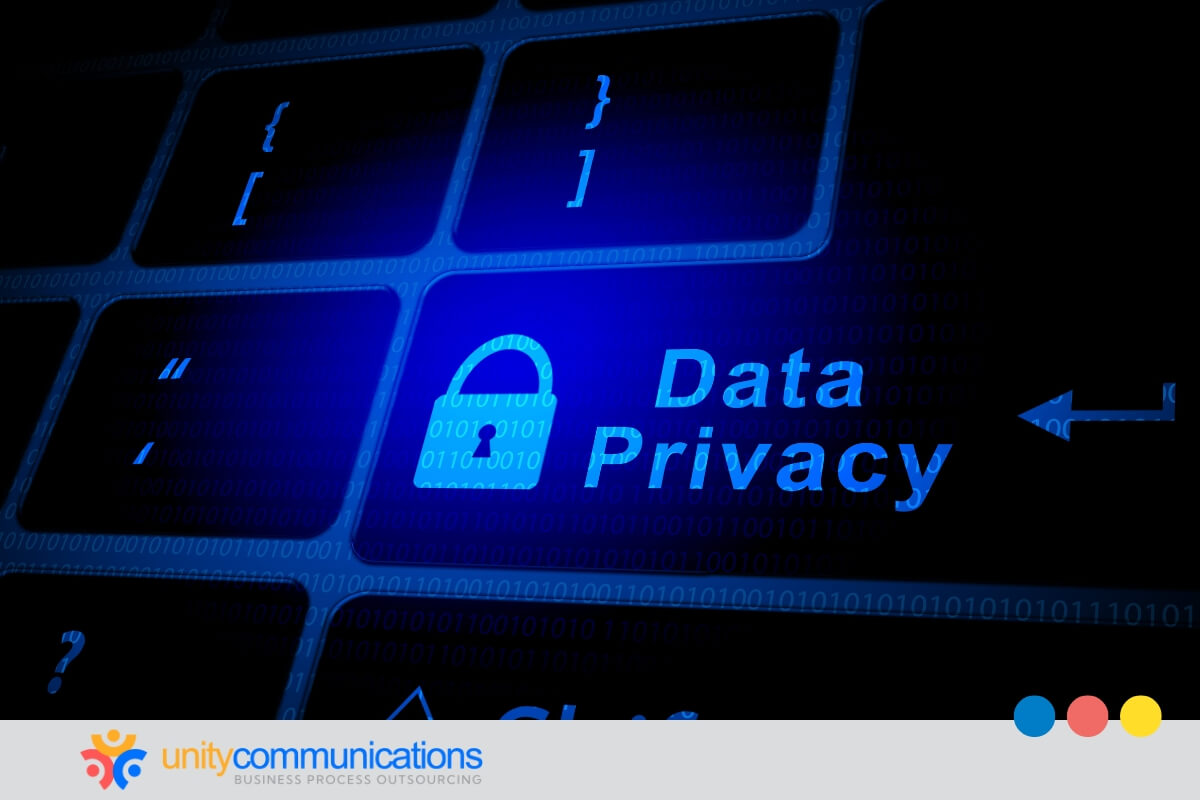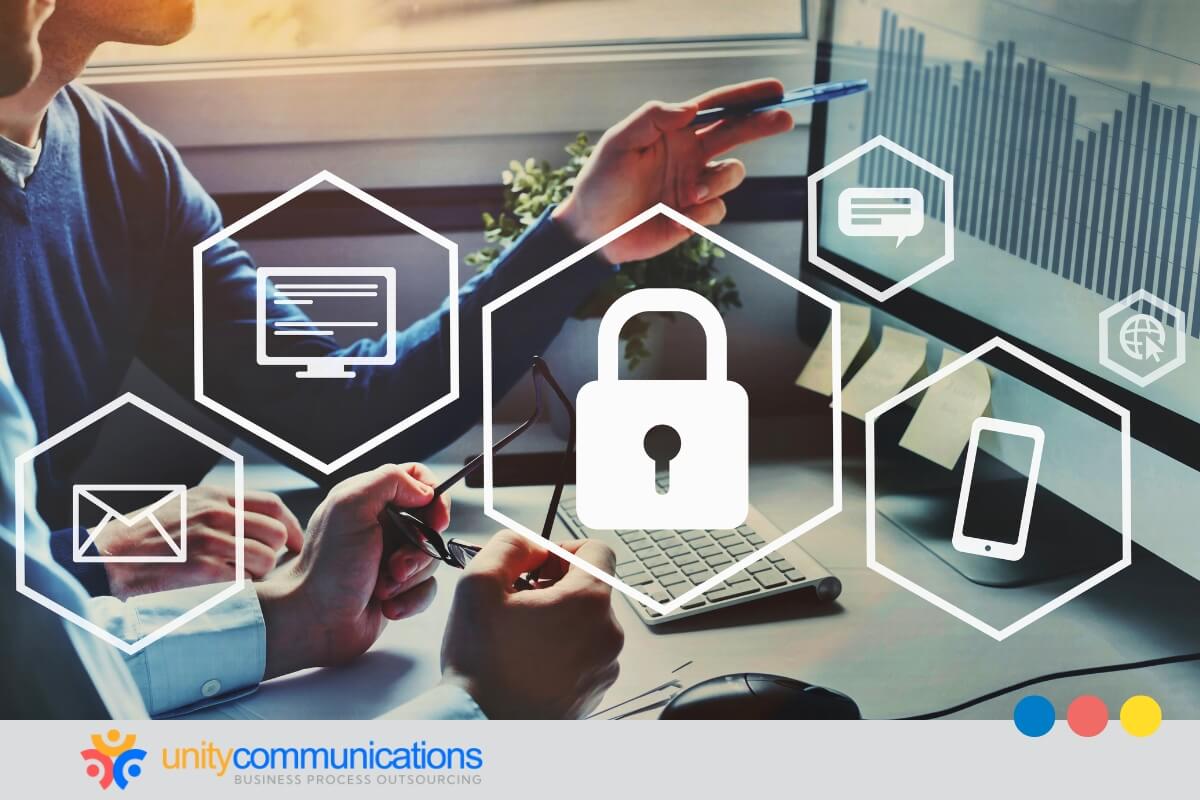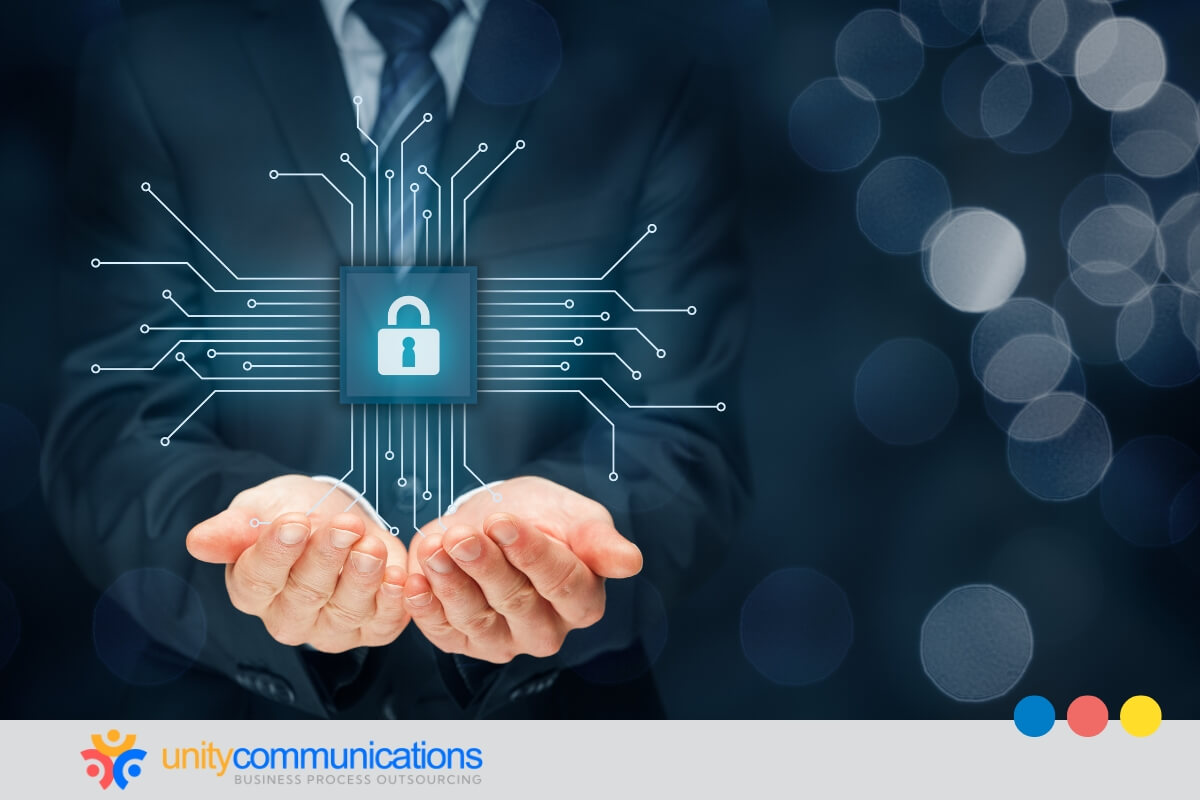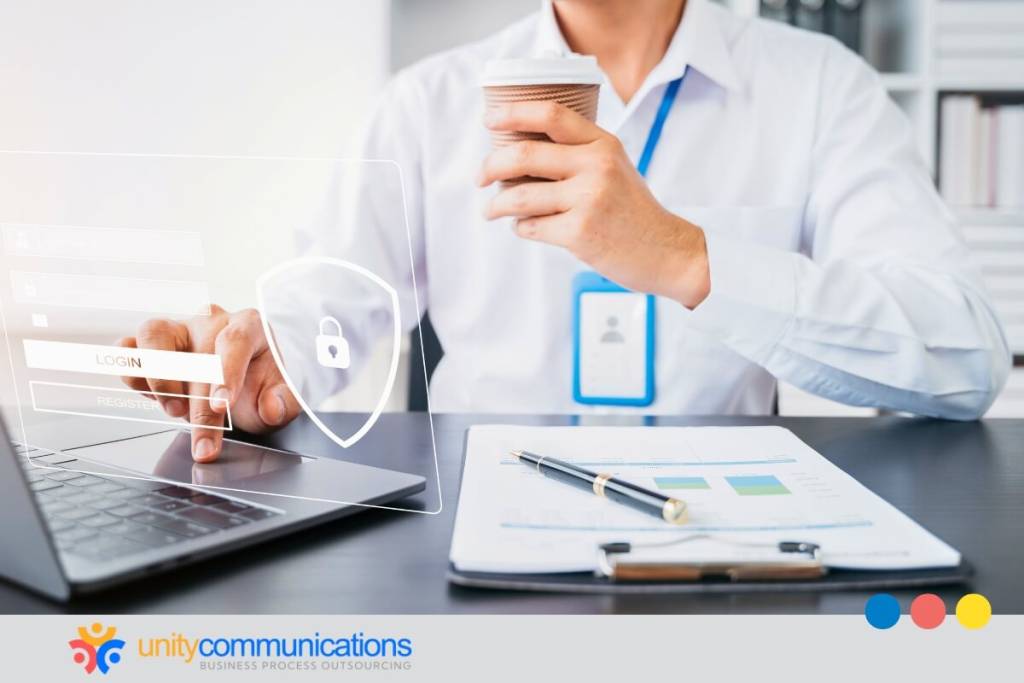IN THIS ARTICLE
Table of Contents
The bustling finance, tech, and healthcare hub of the third-largest city in the U.S. faces constant cyber threats. Protecting sensitive data and infrastructure requires innovative solutions. Thus, voice-assisted cybersecurity solutions emerge as powerful tools for businesses in Chicago.
Your company can leverage this technology via business process outsourcing (BPO). Most Chicago BPO companies offer state-of-the-art call center as a service (CCaaS) solutions, including voice support for cybersecurity.
If you want to learn more about its features, this article is for you. It explores the city’s cybersecurity scene and how voice support can complement your business’s existing data privacy systems.
The Significance of Robust Data Privacy Tactics for Chicago Businesses

Cybersecurity is crucial for protecting valuable assets, ensuring business continuity, and building trust with customers and stakeholders. It safeguards data from unauthorized access, manipulation, or destruction, preventing disruptions and potential financial losses.
However, hackers and fraudsters constantly develop new cybercrime tactics. Companies must regularly update their data security policies to stay ahead of cybercriminals.
This is especially true in Chicago, the top U.S. metro for businesses in 2023. From finance and healthcare to manufacturing and logistics, enterprises across various sectors in the Windy City handle sensitive information.
Cybersecurity Regulations in Chicago
With the city’s status come cybersecurity regulations and laws businesses in the area must comply with. Standard federal and state data privacy codes in the Windy City include:
- Federal Trade Commission (FTC) Act
- Critical Infrastructure Security Agency (CISA) Cybersecurity Framework
- Illinois Personal Information Protection Act (PIPA)
- Illinois Data Breach Notification Act
- Illinois Biometric Information Privacy Act (BIPA)
- Chicago Data Protection Ordinance (DPO)
The City of Big Shoulders also follows industry-specific laws. They guide Chicago businesses in ensuring robust data privacy and security measures.
For example, the Health Insurance Portability and Accountability Act of 1996 (HIPAA) regulates healthcare facilities and covered businesses. It requires them to safeguard their patients’ protected health information (PHI).
Meanwhile, the Gram-Leach-Bliley Act (GLBA) requires financial institutions to protect customers’ financial data.
Common Cybersecurity Mistakes Made by Businesses
The increasing reliance on technology and data makes enterprises attractive targets for cybercriminals. Especially in the case of smaller businesses, companies may lack the resources or expertise to handle such threats. This results in weak and error-prone cybersecurity strategies, including:
- Unbackedup data
- Inadequate passwords
- Insufficient authentication factors
- Unsecured WiFi networks and connections
- Neglected security alerts and warnings
- Outdated software and systems
- Untended physical security
- Inadequate employee training
- Third-party and supply chain negligence
- Overestimated cybersecurity resources
- Non-existent cybersecurity plans
These common mistakes increase your business’s risk of cyberattacks. Hackers can easily crack weak passwords or bypass them through phishing attacks. They exploit vulnerabilities in data security policies.
Consequences of Non-compliance and Weak Security Measures
Chicago enterprises that fall victim to data breaches face severe and far-reaching consequences. Failure to comply with regulations and protect customer information and business assets has financial, reputational, and operational impacts.
Here is a breakdown of the potential repercussions:
- Remedial endeavors. Federal and state regulatory agencies may require your enterprise to implement costly corrective actions. Hiring consultants, executing voice-assisted cybersecurity strategies, and conducting audits are some of the remedies recommended for Chicago businesses.
- Financial penalties. Depending on the regulation violated and its severity, your business can face significant fines ranging from thousands to millions of dollars. For example, non-compliance with HIPAA regulations can result in penalties of up to $1.5 million per violation.
- Civil lawsuits. Customers and patients whose data was exposed due to non-compliance may press charges against your business. These lawsuits can be expensive to defend and settle, considering the financial, emotional, and personal damages caused by data breaches.
- Negative publicity. News of data breaches or cyberattacks can quickly damage your company’s reputation. It leads to public backlash, eroded customer trust, and damaging media coverage. A negative brand image makes attracting new customers and partners challenging.
- Operational disruptions. Viruses and malware from cyberattacks can disrupt computer systems, making it difficult or impossible to conduct business. This disturbance leads to downtime due to data loss, causing lost revenue and missed deadlines. Data breaches can even force companies to shut down permanently.
Real-Life Examples of Cybersecurity Issues in Chicago Businesses
Despite the city’s digital transformation, local businesses still voice concerns and require assistance with cybersecurity attacks in Chicago. To better illustrate the risk of data breaches and cybersecurity attacks in Chicago, here is a brief rundown of recent incidents:
- Community First Medical Center. An unauthorized third-party user accessed the PHI of over 216,000 patients at Community First Medical Center in July 2023. The breach affected names, telephone numbers, email addresses, social security numbers, medical records, and Medicare numbers, directly violating HIPAA.
- Republic Bank of Chicago. In November 2023, the financial firm reported a data breach that affected 7,199 individuals. An unauthorized party accessed sensitive data, including names and financial account information. No news of this data’s misuse has been reported. Nevertheless, it violates the GLBA.
- Chicago Trading Company (CTC). Ransomware is malicious software that blocks access to data and then demands a ransom payment for the decryption key. A cybercriminal organization known as LockBit Gang launched such an attack on the CTC in November 2023. They have since set a deadline for the organization to pay the ransom.
How Voice-Assisted Cybersecurity Enhances Chicago Ventures’ Strategies

According to 360 Research Reports, the global contact and call center BPO market value reached $75.4 billion in 2021. Outsourcing providers leverage the latest technologies to improve their CCaaS solutions, which is why this strategy has surged in demand.
One of the rising advancements in CCaaS is using voice support for cybersecurity to help clients enhance protection against threats. It addresses user authentication and access control, two critical pillars of identity-centered security.
This approach utilizes voice technology, such as assistants and recognition, to streamline security policies. Voice support is not meant to replace your existing cybersecurity measures but to build upon them. It serves as an additional layer of protection, providing complementary support to your current systems.
Below are a few ways voice-assisted cybersecurity complements and benefits your Chicago business’s data privacy and protection systems.
Proactive Detection and Prevention
In real time, voice assistants can detect network data, systems, and configuration vulnerabilities. They can also analyze call content and caller behavior to identify suspicious patterns commonly used in phishing attempts, including:
- Keywords
- Phrases
- Language
- Accents
- Technical terms
- Command sequences
- Word combinations
- Frequency
- Urgency
You can also use voice biometrics and other voice-based authentication methods to replace weak passwords. This approach adds more security to your business’s systems and data. In addition, voice interfaces can assist you in providing cybersecurity best practices training for your Chicago-based employees.
Improved Response Speed
Your business can quickly address data privacy threats through the proactive detection feature of cybersecurity voice support, leading to:
- Rapid threat reporting. CCaaS outsourcing providers can program voice assistants to instantly alert administrators and security teams about suspicious activities detected on calls. Such incidents include unauthorized account access attempts or data breaches. Faster notifications lead to quicker response times and better threat management.
- Automated incident response. Programmed voice interfaces can also follow pre-defined incident response protocols. This approach automates incident response, isolating compromised systems, and initiating recovery procedures. With more efficient mitigation, your business can reduce downtime and data loss.
- Passwordless authentication. Voice biometrics or other voice-based authentication methods can replace weak passwords, adding an extra layer of security to systems and data. This feature reduces the need for complex codes and the risk of unauthorized access due to compromised passwords or social engineering attacks.
User-friendly Implementation
Improving the user experience is the driving force and primary goal behind the development of voice technology. It requires less cognitive effort than visual-based interfaces, diminishing the need to memorize commands. Here’s why voice support makes cybersecurity user-friendly:
- Improved accessibility. Voice interfaces require minimal technical expertise and assistance, making cybersecurity more accessible to your Chicago firm’s employees. Such conditions enable a data privacy culture within the organization. It increases overall awareness of cyber threats among staff, regardless of their levels of computer literacy.
- Streamlined reporting and mitigation. Voice commands allow staff to quickly report potential security concerns. It enables them to bypass complex systems, ensuring timely communication of threats. This technology also streamlines risk management techniques such as multi-factor authentication (MFA) and password reset.
- Hands-free security management. Your team can rely on voice assistants to perform security tasks. This feature is valuable in situations where keyboard usage is impractical or limited. Simplified measures reduce the risk of employee disengagement in data privacy protection initiatives, strengthening your organization’s overall security.
The Bottom Line

Chicago’s emergence as a business hub has become increasingly attractive to hackers and fraudsters. Despite implementing robust security strategies, some companies still face costly and disruptive threats and attacks.
Thus, many turn to voice-assisted cybersecurity through CCaaS solutions and outsourcing. This new technology offers many features that complement existing systems. It provides proactive detection and prevention, allows faster response times, and makes cybersecurity more accessible.
Let’s connect if you want to learn more about implementing voice-assisted cybersecurity interfaces for your Chicago business. We will discuss the best option to complement your Chicago business’s data privacy policies.





